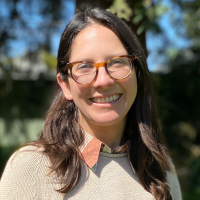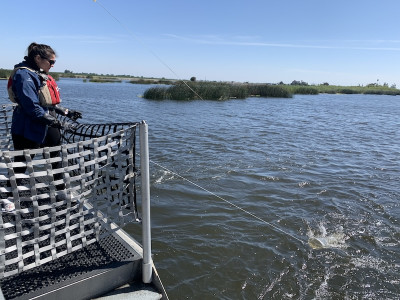Growing up in a farming family in the Salinas Valley, Tara Pozzi learned about the impacts of extreme weather, particularly flooding. After she left for college and began to connect those flood events to the broader impacts of climate change, Pozzi began to think bigger: There’s a network of actors influencing regional adaptation efforts, she realized. Now a doctoral student at the University of California, Davis, studying environmental behavior and policy, Pozzi has spent the past two years creating a first-of-its-kind map that shows how various groups in the region — from nonprofits to municipal governments to tribal organizations — are interconnected.

“Mapping the network of organizations engaged in adaptation revealed that the technical knowledge is there,” says Pozzi. “People know how to adapt, but there’s not always enough financial support or clarity about which adaptation efforts to prioritize. ”
Pozzi’s project is one of eight undertaken by the 2022 cohort of Delta Science Fellows, who recently completed their two years of funding. The projects advance the state of knowledge of the high-priority science issues that impact the Sacramento-San Joaquin Delta — or the Delta, as it’s often known — and its management. California Sea Grant administers the fellowship program on behalf of the Delta Science Program, which funded seven of the 2022 fellows; one additional fellow was funded by the State Water Contractors, an association of California’s public water agencies.
Andreja Kust, another member of the 2022 fellowship cohort, began her research into cyanobacterial harmful algal blooms, or cyanoHABS, in the Czech Republic; she didn’t even know that the Delta existed until she arrived at the University of California, Berkeley, to conduct postdoctoral research. But soon she realized that these microorganisms pose similar challenges in these local waters, too. Her work uncovered a variety of unexplored genes in Delta microorganisms that could produce different, potentially harmful molecules, guiding future research to protect public health.
Other fellows’ work included investigations into the habitat of native snakes, the movement and impacts of pesticides and how wetlands help process the carbon emissions that sit at the center of the climate crisis. Such projects would have been impossible without the support of the fellowship, Kust says.

“To get my samples, I had to find people who would take me out on boats,” she explains. The fellowship’s prestige helped open those doors. “It was amazing,” she says. “I developed this large network — people in all different fields — that I know I will still tap into in the future.”
For Pozzi, too, the emphasis on partnership — in particular, working with a community mentor — was a big draw. She knew that deep connections with the agencies and communities in the region were important to advance her work.
“One goal of this fellowship is to train the next generation of science leaders,” says Lisamarie Windham-Myers, Delta Lead Scientist with the Delta Stewardship Council. “This latest cohort is a perfect example: Their work is already advancing management-relevant research in line with the Council’s Science Action Agenda. For example, designing tidal wetland restoration for multiple benefits can draw from Maiyah Matsumura’s measurements of carbon fluxes and Megan Pagliaro’s analyses of food web connections. Similarly, Longfin smelt and Chinook salmon analyses by Parsa Saffarinia and Garfield Kwan, respectively, are quantifying both direct and indirect impacts of a warming climate on endangered species of fishes.”
But the fellows are only getting started in the Delta, Pozzi notes. “The fellowship provided a great foundation — setting me up for who I am as an academic in this system,” she says, capturing a common sentiment. “I'm really hoping to continue building on the relationships that I've formed during this time.”
The 2022 Delta Science Fellowship cohort comprised:
- Elsie Cecilia Carrillo, a doctoral fellow at UC Santa Cruz, investigated the diversity and thermal physiology of snake species throughout the Delta and their functional role in its ecology.
- Andreja Kust, a postdoctoral fellow at UC Berkeley, studied the genetic sequences of cyanobacteria to understand the drivers and impacts of harmful algae blooms.
- Garfield Kwan, a postdoctoral fellow at the Scripps Institution of Oceanography (US San Diego), improved conservation tools that identify stressful temperature and hypoxia conditions for key fish species.
- Maiyah Matsumura, a master's fellow at CSU East Bay, refined models of carbon sequestration rates in tidal wetlands by measuring the export of dissolved inorganic carbon.
- Megan Pagliaro, a doctoral fellow at UC Berkeley, assessed how restoration efforts in tidal marshes have changed how native and non-native species interact within local food webs.
- Nicol Parker, a doctoral fellow at UC Santa Barbara, updated her previously developed model of pesticide risks to include new irrigation data, degradation rates and impacts on humans and other species.
- Tara Pozzi, a doctoral fellow at UC Davis, mapped the institutions and actors that make up the governance network overseeing climate adaptation in the Delta.
- Parsa Saffarinia, a postdoctoral fellow at UC Berkeley funded by State Water Contractors, is investigating how changes in longfin smelt populations over the past five decades are intertwined with environmental drivers and zooplankton abundance.
About the Delta Science Program
The mission of the Delta Science Program is to provide the best possible unbiased scientific information to inform water and environmental decision-making in the Delta. The program carries out its mission by funding research, synthesizing and communicating scientific information to policy and decision-makers, promoting independent scientific peer review and coordinating with Delta agencies to promote science-based adaptive management. The Delta Science Program is managed by the Delta Stewardship Council, an independent state agency that works to advance the state’s coequal goals for the Delta: achievement of a more reliable statewide water supply and a healthy and protected ecosystem, both in a manner that protects and enhances the unique characteristics of the Delta as an evolving place.
About the State Water Contractors
The State Water Contractors (SWC) is an association of California’s public water agencies and represents the legal, policy and regulatory interests of the State Water Project contractors, who are responsible for the capital and operations and maintenance costs of the SWP. The SWC works in partnership with other water organizations and coordinates with the Department of Water Resources on behalf of its members. Its mission is to advocate for improved supply reliability and water quality based on sensible, science-based policies that result in sustainable and cost-effective management of the SWP for California’s citizens, economy and environment.